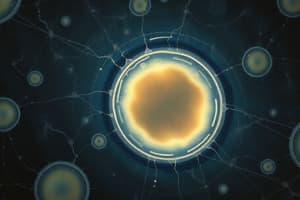Podcast
Questions and Answers
What is the primary function of the endoplasmic reticulum (ER) in cells?
What is the primary function of the endoplasmic reticulum (ER) in cells?
- Site of cellular respiration
- Site of protein synthesis
- Site of DNA replication
- Site of phospholipid synthesis (correct)
Which mechanism is required for molecular pumps to function effectively?
Which mechanism is required for molecular pumps to function effectively?
- Passive transport only
- Electrochemical gradients or ATP hydrolysis (correct)
- Facilitated diffusion
- Simple diffusion
How does genetic information get passed on to daughter cells?
How does genetic information get passed on to daughter cells?
- Through protein synthesis
- Through one-dimensional chemical sequences in DNA (correct)
- Through the assembly of macromolecular structures
- Through one-dimensional chemical sequences in RNA
What role do signal-receptor interactions play in cellular function?
What role do signal-receptor interactions play in cellular function?
What process describes the formation of macromolecular structures from their subunits?
What process describes the formation of macromolecular structures from their subunits?
What is a primary characteristic of cell biology?
What is a primary characteristic of cell biology?
Why is cell differentiation important in multicellular organisms?
Why is cell differentiation important in multicellular organisms?
How is genetic information stored within living cells?
How is genetic information stored within living cells?
What happens to membranes as they grow?
What happens to membranes as they grow?
Which of the following is NOT a universal principle of living cells?
Which of the following is NOT a universal principle of living cells?
What is the fundamental unit of life in biology?
What is the fundamental unit of life in biology?
What is the total range of genes that most bacteria and archaea contain?
What is the total range of genes that most bacteria and archaea contain?
Which type of cell can only be inherited from the mother?
Which type of cell can only be inherited from the mother?
Flashcards are hidden until you start studying
Study Notes
Cell Biology Introduction
- Cell size and shape vary greatly
- Visualizing cells requires specialized techniques
- Cell biology studies cell structure and function, focusing on the cell as the fundamental unit of life.
Key Features of Cell Biology
- Experimental science: Cell biology relies on experimentation to understand cellular processes.
- Essential for multicellular organisms: Cell differentiation and division are crucial for development and growth in complex organisms.
- Cell aging: Cells have a lifespan and undergo aging processes.
Biological Diversity
- Living organisms are classified into three primary divisions: bacteria, archaea, and eukaryotes.
- Eubacteria are single-celled organisms with a simple cell structure.
- Archaea are also single-celled organisms, but they have unique evolutionary history and biochemical properties.
- Eukaryotes include plants, animals, fungi, and protists, and their cells are more complex than bacteria and archaea.
Universal Principles of Living Cells
- Genetic information: DNA stores genetic information in a linear sequence, which is duplicated and passed on to offspring.
- DNA code: The DNA code determines both the sequence and 3D structure of RNA and proteins.
- Macromolecular assembly: Large structures within cells are built from smaller subunits.
- Membrane growth: New membranes are formed by expanding existing membranes.
- Signal-receptor interactions: Cells use specific signals and receptors to direct molecules to their correct locations.
- Cellular movement: Cells use diffusion, pumps, and motors to move molecules within the cell.
- Molecular feedback mechanisms: Cell processes are regulated by feedback mechanisms, controlling molecular composition, growth, and differentiation.
Studying That Suits You
Use AI to generate personalized quizzes and flashcards to suit your learning preferences.




